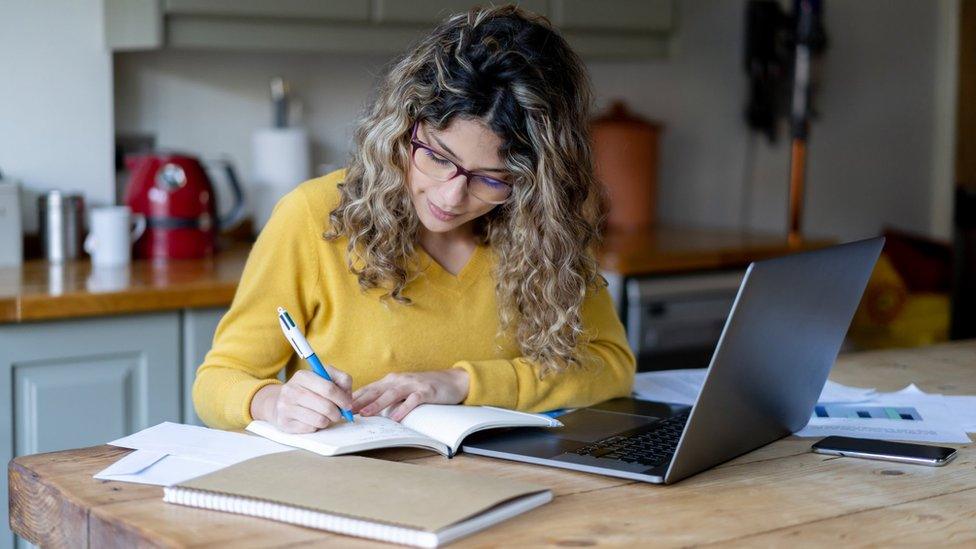Covid-19: PM thanks teachers, a third wave warning and triplets on their 'big day'
- Published
Here are five things you need to know about the coronavirus pandemic this Monday evening. We'll have another update for you tomorrow morning.
1. PM praises 'astonishing' effort after 'emotional' school return
After millions of pupils returned to schools across England and Northern Ireland today, Prime Minister Boris Johnson thanked teachers, parents and pupils for their "astonishing" efforts. He told a Downing Street press conference that the return to schools was "a big day and an emotional day". He added that while some have been anxious about the return, "the greater risk" would be keeping children out of school "a day longer". Head teachers, meanwhile, said the first day back in England had "gone well". You can read more about the rules for the reopening of schools here.
The PM says the work of teachers and parents juggling home-school has been "astonishing"

2. Another Covid wave 'could easily take off'
The latest figures show the UK has recorded a further 65 deaths within 28 days of a positive Covid test, and a further 4,712 cases. Dr Jenny Harries, deputy chief medical officer for England, told the Downing Street briefing this meant case levels were back to what they were at the end of September. She warned, however, that "this is a level at which a new wave could easily take off again from". It is "really important" that everyone continues to practise social distancing and follows the rules in place, she added. You can read more about the levels of Covid-19 in the UK here.


3. BP staff set to work from home two days a week
BP has told office-based staff they will be expected to spend two days a week working from home after lockdown restrictions ease. The oil giant said in meetings last month that most would be asked to work from home 40% of the time, or two days a week for full-time employees. The new "hybrid" work model will affect 25,000 BP staff, with 6,000 in the UK. It comes as part of a cost-cutting drive for the firm, which saw thousands of job cuts announced last year. BP informed staff of the changes in "town hall" meetings in February, and suggested that it would offer a "more flexible, engaging and dynamic way of working".


4. Government defends school testing plan
The government is sticking to the rule that a positive rapid Covid test done in secondary schools in England cannot be overruled by the gold-standard tests processed by labs. Concerns have been raised by testing experts that significant numbers could be incorrectly told they are infected by the less accurate, rapid tests, leading them and their families to self-isolate for no reason. Asked if children should be allowed to exit self-isolation if the more reliable PCR test gave a negative result, children's minister Vicky Ford told the BBC: "They should not take the risk, we all want to make sure we can keep Covid out of the classrooms here." You can read more about school testing here.


5. Triplets discuss their 'big, important' return to school
A mother of eight-year-old triplets has filmed a video diary to record their return to school. The trio - Yimi, Mbetmi and Waimi - said the day was "big" and "important" and it felt "so nice" to be back in their uniforms. Mum Esther, from Hucknall in Nottinghamshire, said: "The house is so quiet. I kind of miss them... but it's quite a good thing that they are going back to normal." You can read more from pupils on their return to school here, and you can watch the video of Yimi, Mbetmi and Waimi below.
Video diary: Triplets return to school


And don't forget...
You can find more information, advice and guides on our coronavirus page. This page looks at the falling number of daily cases in the UK, plus other data.


What questions do you have about coronavirus?
In some cases, your question will be published, displaying your name, age and location as you provide it, unless you state otherwise. Your contact details will never be published. Please ensure you have read our terms & conditions and privacy policy.
Use this form to ask your question:
If you are reading this page and can't see the form you will need to visit the mobile version of the BBC website to submit your question or send them via email to YourQuestions@bbc.co.uk, external. Please include your name, age and location with any question you send in.

